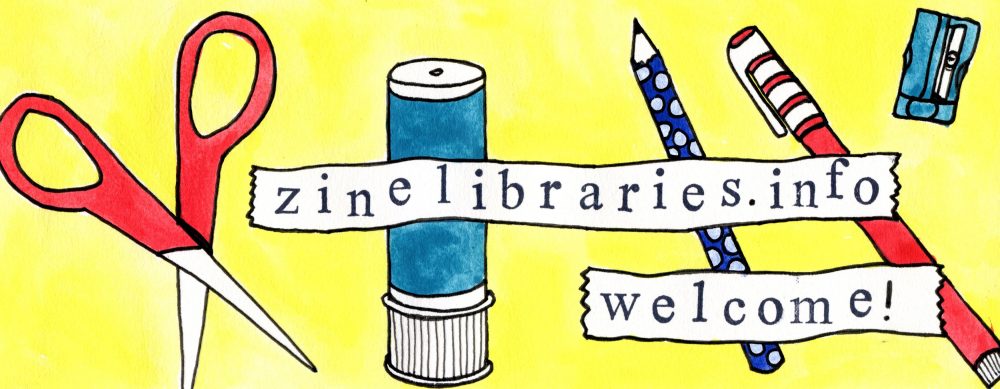Friday July 18th (notes submitted by Violet)
For background information, download the xZINECOREx zine at http://zinelibraries.info/2013/04/12/zinecore-zine/
Milo and the folks at QZAP have been beta testing ZINECORE with their catalog using an open-source software called Collective Access. (See the QZAP catalog in action at http://archive.qzap.org/index.php) QZAP has left a subject field empty with the idea that there will be an agreed-upon ZINECORE taxonomy in the future. Milo walked us through an example record, explaining that, for example, they’re using the sizes that were listed in Larry-bob’s “Queer Zine Explosion†for the “format†field. The catalog also uses the field “relationâ€, with the displayed term “related collectionâ€, to show the “is part of†relator.
Jenna reported on Christina Harlow’s efforts to help out with the project. She used data sets from Denver Zine Library, QZAP, Barnard [and others? IPRC?] to create a data snapshot, which shows the variety of schemas that we’re working with. The good news is that since ZINECORE maps very closely to Dublin Core, Christina will be able to reuse existing mapping tools with some tweaking. Some challenges to deal with: our content is “polyâ€; there’s no authority records and differences in our libraries’ definitions of fields could be problematic (for example, for zines published by one person, some libraries have referred to the creator as “publisher†while others haven’t). Â
Jan took a moment to remind us to be reflexive and clearly explain why we’re creating xZINECOREx and the union catalog (and, in general, with any of our projects). The temptation is to just get the work done, but the more we can be clear and document the decisions made along the way and why those decisions were made, the better we can strive to remain true to our principles.
We discussed the possibility of institutional support: OCLC sometimes offers funding for linked data projects. In the archival world, there are consortium of collected national authority resources. The SNAC (Social Networks and Archival Context) Project is designed to provide access to a variety of contexts, building socio-historical contexts by harvesting names from collections of archival records. There was some discussion as to how xZINECOREx could be implemented in archives, and how finding aids could provide context for the information in xZINECOREx records.
Standardizing data is a big concern, but we agreed that we don’t want to set a high bar for libraries to contribute their data to xZINECOREx. We want to minimize worries that individual libraries’ data isn’t “good enough†for inclusion.
We discussed standardized vocabularies [both in this session and Saturday’s “Taxonomies†session], and generally came to a consensus that using already existing vocabularies such as LCSH and Anchor Archive’s thesaurus would be preferable to the efforts of creating our own. As long as the vocabularies are available as linked data, we could use pointers that would indicate, “this vocab term comes from this controlled vocabulary setâ€. We also discussed the fact that subject and genre are combined in one field in xZINECOREx (which was done consciously since there was debate at the Milwaukee ZLuC re: aboutness/itness). It would be ideal if we could have separate genre and subject fields as an option for advanced searching.
There are continuing questions we’ll have to deal with as we move forward: for example, if there are multiple records for an individual zine, which would be the “primary†record? Where will we host the union catalog?
Notes continued here: http://zinelibraries.info/wiki/zluc2014/schedule/zine-union-catalog-part-ii/
